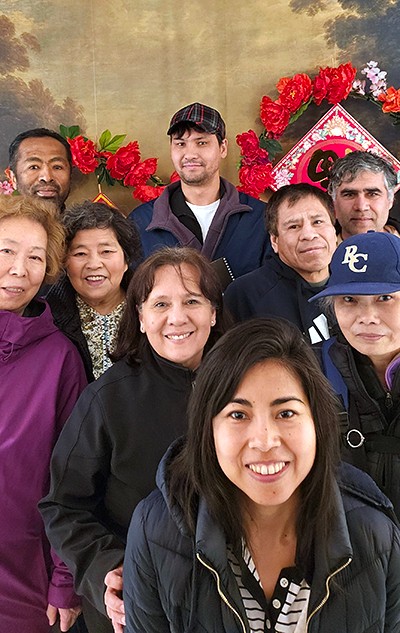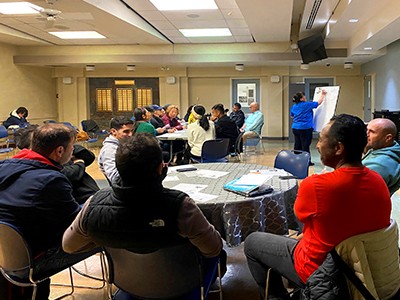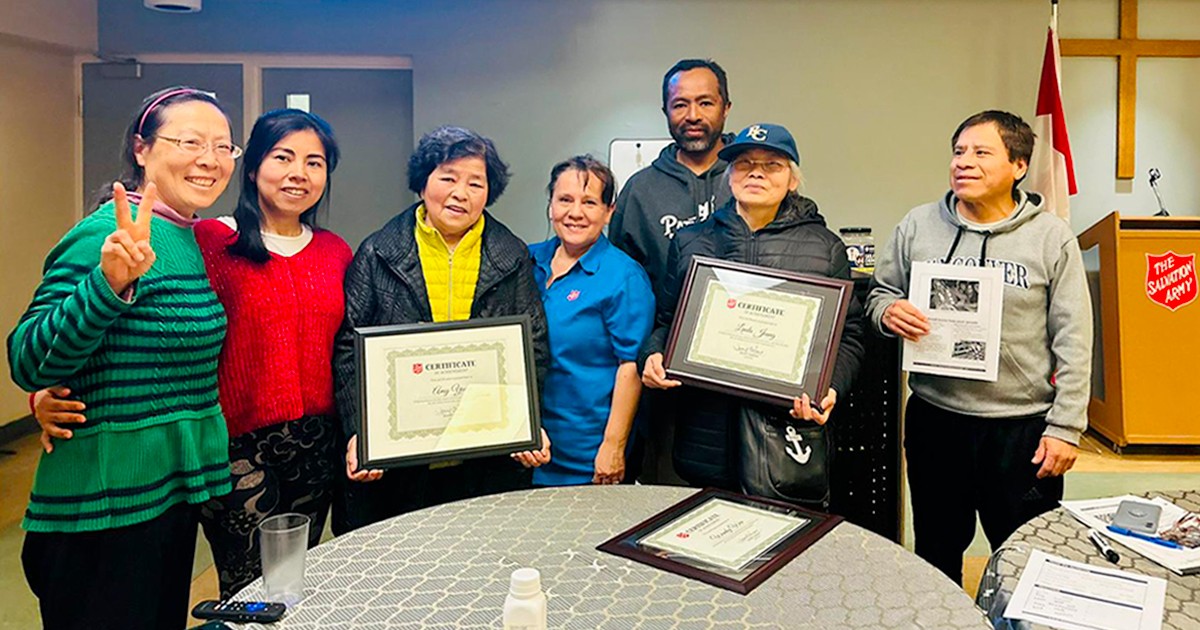As the corps officer at Anchor of Hope Community Church in Vancouver’s Downtown Eastside, Captain Jenny Marin noticed an increase in the number of people arriving from places such as Africa, Afghanistan and Mexico. Looking for ways to serve these newcomers, as well as residents at the Army’s nearby Harbour Light facility, the church decided to offer an ESL class, to help break down language barriers and create a sense of community and belonging.
“We thought an ESL class would help start that integration process for them,” says Captain Marin, who runs the class every week with the help of an assistant teacher and volunteers. “We advertise it in the shelters, as well as the community. There’s a women’s centre right around the corner that has become involved.”
A diverse group of 10-15 individuals of all ages attend the ESL class, including residents from the women’s centre, men from nearby shelters, clients of Harbour Light, and people from the Downtown Eastside community. “There are some people who attend regularly and some people who attend whenever they can, and we welcome them all of the time,” says Captain Marin.
What Captain Marin enjoys most about the group is seeing the integration and connections formed among the people who attend. “There are younger men from the shelter who are working together with elderly women from the community,” she explains. “That is what community building is all about.”
Learning Joyfully

Anchor of Hope currently uses an ESLcurriculum that is designed for people who move to British Columbia’s west coast, particularly the Vancouver area. The program teaches participants area-specific lessons such as how the transit system works, while helping them develop their English language skills. According to Captain Marin, the group also focuses on Canadian historical and cultural lessons, including the meaning of the maple leaf or the significance of celebrations, such as Easter and Thanksgiving. Through this, participants learn more about Canada while developing the basics of grammar, reading and writing.
“Language is a barrier. But it’s interesting to see the skills that each person has. Someone may have difficulty with the speaking component, but they excel in writing. Others have amazing memory and can remember concepts and definitions,” says Captain Marin. “It’s incredible. I’m always surprised by how God gives different gifts.”
Captain Marin, a native Spanish speaker, teaches the class herself with an assistant teacher, Sara Gonzales, and a few volunteer leaders. In addition to interactive classes with letter and number games, memory games and puzzles, the class often ventures out into the city for field trips. In February, they visited the Chinatown Storytelling Centre in the heart of Vancouver’s Chinatown district. The trip gave participants an opportunity to explore the area and learn about its rich history and traditions.
“We try to keep it lively,” says Captain Marin. “The learning component has to be something that they remember joyfully.”
Community of Love
Among the regular ESL participants is Amy Yuan from China, who joined the group in 2022 and has since learned enough English to communicate with others confidently. “I feel I have expanded my circle because I can communicate better with new people,” says Yuan. “I see the people in my class as my friends, and I am grateful for the teachers at the ESL program. I look forward to continuing learning.”
Like Yuan, Elias Segura Moctezuma, from Mexico, started attending the ESL program a year ago, and now feels confident in his knowledge of English basics. “In this group, I have learned to relate to people from other cultures and backgrounds, and I have the opportunity to learn from them,” he says.
By learning English, Moctezuma has become more secure in his speaking skills as he integrates with the community around him and meets new people. “I feel much better about myself, and I have been able to volunteer in some of the other programs at Anchor of Hope.”
For Captain Marin, the ESL group is a way to establish a connection with people on a regular basis. It is a personal and spiritual approach to creating a community where people know they are cared for. “That’s what Jesus wants. He wants that community of love. That is our mission,” says Captain Marin, who hopes the group helps remind people that they belong and are part of the community. “You are thought about and sought after. We want to build up your confidence and your sense of belonging.”
Opening Doors
Anchor of Hope’s ESL lessons take place in the chapel, and the people who attend know about The Salvation Army and its Christian framework. “I’ve talked about Jesus during lessons and we sing Amazing Grace,” explains Captain Marin. “But many of the individuals not only come from a different culture, but they also come from a different religion or no religion at all. So, it takes time to move from that initial learning curve of ESL into the evangelistic and spiritual realm.”

Some people who attended ESL in the past are now part of the church. Others may not attend the church, but they know they are part of a wider Christian community that welcomes them and loves them. According to Captain Marin, this can open the door for educating people about Jesus.
One day, a woman from the ESL group came into the church at Christmastime and didn’t know what a Nativity scene was or what it meant. “That initiated a conversation with her, and I told her about Mary and Jesus, and why the Nativity is important to Christians,” shares Captain Marin.
Regardless of their beliefs or understanding of Christ, Captain Marin ensures that she invites them to other activities in the corps so that they feel included, whether they choose to join the church or not. “For example, Thanksgiving dinner is one of the topics that we discuss in the ESL class. So, we invite them to our Thanksgiving dinner at the corps, as well as other cultural events, such as Christmas gatherings and our candlelight service,” says Captain Marin. “The idea is to make them part of what we do.”
Love New Canadians
In January, the Canada and Bermuda Territory launched a new partnership with Love New Canadians to help equip ministry units to provide practical and evangelistic programming to new Canadians. Since its launch, many corps and social services ministry units across the territory, including Anchor of Hope, have connected with Love New Canadians to explore what this curriculum could look like in their own ministry settings.
Love New Canadians, founded by Rick and Patti Love, offers a comprehensive outline for programming, including how to get started, how to make initial contacts, and how to bridge a curriculum from learning English to learning about Jesus in a dignified and non-threatening way. It empowers ministry units to build outreach and evangelism programs from the ground up, providing webinars, one-on-one coaching and other resources to help define the program’s purpose, direction and structure.
With Love New Canadians, any ministry unit that wants to start programs for newcomers can do so, even those who might feel they are too small or lacking in resources. As Major Doug Binner, territorial corps life director, notes, all you need is one or two volunteers with a smile and a listening ear. “You don’t have to start big,” he says. “Even if it’s just once a month for a small gathering of family services clients. That’s a great start. It’s a connection, and from there we begin to build relationships.
“That’s how doors open,” he concludes. “Start with what you’ve got, and then let God multiply.”
Photos: Courtesy of Cpt Jenny Marin










Estoy muy agradecido por encontrar estas oportunidades, y considero que son un ejemplo a seguir.